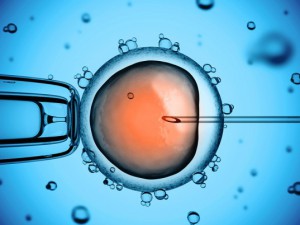The Legal Consequences of Three-Parent Babies
Britain just became the first country to legalize Mitochondrial DNA Transfer, or Three Parent IVF. The treatment uses DNA from two women and a man to conceive a child. The process takes one woman’s egg and replaces “defective” DNA with “healthy” DNA from a second woman. The purpose of the treatment is to help couples conceive a child without passing on severe genetic disorders.
 There’s a great deal of controversy over this new technology because it’s a natural assumption that a child can only have two biological parents. There simply isn’t a legal framework to recognize more than two biological parents. Although Britain is willing to go forward, other countries, including the United States, are taking a “watch and see” approach.
There’s a great deal of controversy over this new technology because it’s a natural assumption that a child can only have two biological parents. There simply isn’t a legal framework to recognize more than two biological parents. Although Britain is willing to go forward, other countries, including the United States, are taking a “watch and see” approach.
The most common criticism is that the technology has not been adequately tested on humans and that any potential babies from this IVF will be at risk of cancer or other defects. More importantly, there is concern this new process could be the slippery slope to “designer babies.” If science can remove undesirable genetic disorders, science can also remove – or modify – other traits. In the future, this DNA transfer could lead to parents shopping for the traits they find most desirable: sex, hair color, eye color, musical capabilities, etc.
While everyone is focused on the issue of designer babies, there are other interesting legal issues that could arise. For instance, lesbian couples could finally have a child who is genetically related to both women. In those arrangements, the man required in a Three Parent IVF would merely be a sperm donor. But technology is often as much a curse as it is a blessing.
Three-Parent IVF is a new technology, but it has the same legal problems as other forms of assisted reproduction presents. Assisted reproduction cases involve parentage issues. Surrogate mothers and sperm donors agree to help conceive the offspring in exchange for money and freedom from legal liability to the child.
In surrogacy, it’s possible the couple can’t afford to support the child and will sue the second woman for child support. Of course, if a couple can afford a new and thereby expensive medical procedure, then the couple probably can afford to support a baby. On the other hand, the donor could have a change of heart about having parentage rights severed. The remainder of this article will discuss the latter.
Surrogacy and Three-Parentage
The woman who donated the DNA could be treated the same way as a sperm donor. In a sperm donor arrangement, a man could provide sperm, outside of sexual intercourse, to a woman. The man in the couple would then adopt the child as his own even though he is not genetically related to the child. The sperm donor, the biological and legal father, would have his rights severed under the donor agreement. Most states recognize sperm donor agreements. However, the couple must follow state procedures if they wish to terminate the sperm donor’s rights.
Courts could find the second woman in Three-Parent IVFs to be akin to sperm donors. The analogy is even more intuitive than surrogacy agreements because sperm is a vehicle for DNA and DNA is what the second woman is giving. Judges could merely read sperm donor laws as gender neutral. Courts could hold that the same procedures terminating the natural rights of sperm donors apply to women who donate DNA.
On the other hand, the Three-Parent IVF could be viewed as a surrogacy. Three-Parent IVF can be thought of as a reverse surrogacy. While surrogacy procedures require an unrelated woman to give birth to the couple’s child, Three-Parent IVF requires that the biological mother give birth to a child who is related to another woman. It’s possible to view the Three-Parent IVF as a surrogacy, with the birth mother a surrogate for the woman who donated the DNA.
Obviously this legal angle won’t work if the state doesn’t recognize surrogate agreements. Many states regard them as contracts to sell infants and courts will refuse to uphold them. Other states find nothing wrong with them and courts will hold that the intentions of the biological parents will decide the outcome.
Determining Parentage
In Three-Parentage cases, it might be difficult to determine which woman intended to be the legal parent and which woman was a surrogate. The easiest way might be to determine which couple (woman plus partner) was the party to the contract, but that wouldn’t be helpful if both women were in a relationship prior to the DNA mixing.
Proponents of Three-Parentage have asserted that the child wouldn’t be equally related to all three parents. The child wouldn’t be one-third related to each parent because the donor’s DNA is only supplied to “fix” genetic defects. It’s more likely that the child will be related to the donor by only one or two percent.
However, I would shocked if there weren’t any judges who would refuse to award custody based on the percentage of genes a child shares with a person. Grandparents and other relatives would be at a disadvantage, a disadvantage that would be unfair if they were more involved in a child’s life than persons who are genetically closer but emotionally distant. Genetic lottery is not a legal standard that any court should adopt. The child’s best interest is currently the default standard and nothing should change that.


Comments